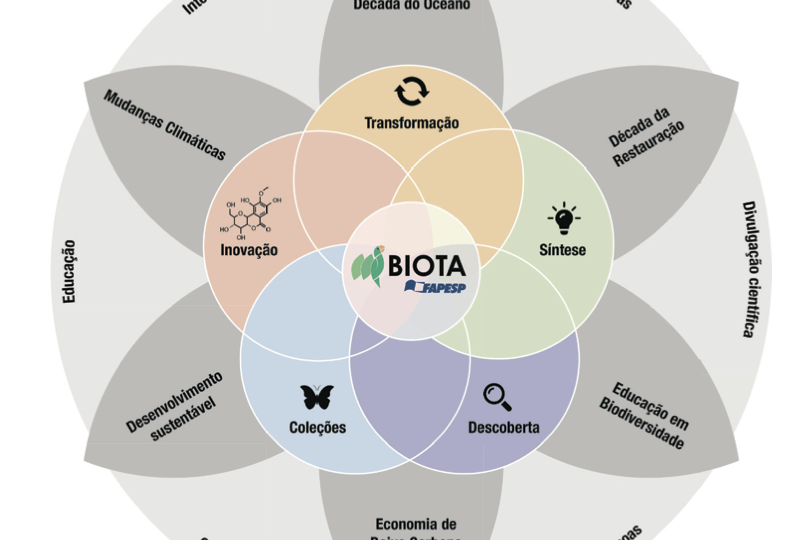
Nature has been a source of inspiration for new products and processes since ancient times. Brazil is a highly privileged country in terms of biodiversity, ecosystems, biomes and hydrographic regions, with an enormous wealth of biological resources and ecosystem services. The Biota Program, through its Innovation Axis, aims to promote and support research to increase the capacity to develop innovative solutions to specific problems and opportunities for transforming society, which is the basis for creating new businesses, companies or socio-environmental approaches.
Already in 2003, the Biota Program recognized the importance of promoting projects for the chemical characterization of biodiversity in the State of São Paulo, which led to the creation of the BIOprospecTA subprogram. The initial objectives of this subprogram were focused on the search for biologically active natural products from the biodiversity of the State of São Paulo for future pharmacological and toxicological studies. Today, the opportunities for innovation based on biodiversity have expanded, but are still underexploited.
The potential for developing high-value-added bioproducts, as well as for harnessing ecosystem services, promoting ecological restoration and sustaining nature-based solutions (i.e. solutions that benefit from ecosystem processes, such as pollination and pest control, contributing to agricultural production, slope stabilization, water regulation, urban climate mitigation, etc.) is enormous. Biodiversity-based innovation and entrepreneurship approaches include business opportunities and advances in environmental monitoring strategies (e.g. equipment, sensors, platforms), management techniques, and education and communication activities. In addition, whenever possible, these actions should incorporate the knowledge of indigenous peoples and traditional communities, as well as the perspective of equitable sharing of the benefits derived from nature.
Socio-environmental integration remains a challenge, but it must be integrated into innovation and entrepreneurship programs as a strategy to generate wealth for local populations and promote the conservation of natural resources in production chains based on sustainability. This set of initiatives can increase the resilience of terrestrial and aquatic environments and promote the development of a sustainable economy while highlighting the importance of biodiversity and its conservation.
MAIN GOAL
To promote, encourage and identify opportunities for innovation in bioproducts and ecosystem services.
CHALLENGES TO BE ADDRESSED
- Facilitate the development of bioproducts and bioprocesses that can serve various industrial sectors: pharmaceuticals and medicines, cosmetics, fragrances, food supplements, agro-industry, and biomass, among others;
- Promote the use of ecosystem services and develop nature-based solutions;
- Encourage partnerships between researchers and companies aimed at the sustainable use of biodiversity and ecosystem services;
- Encourage the creation of small businesses (start-ups) focused on the responsible development of bioproducts and the sustainable use of ecosystem services;
- Encourage the development of technologies for environmental monitoring and management and promote strategies for the conservation of biodiversity and ecosystem services from the perspective of socio-environmental entrepreneurship;
- Promote the development of bio-products based on production chains that promote social inclusion.
ACTIONS
- Disseminate experiences of innovation and entrepreneurship with biodiversity assets, bringing together young entrepreneurs, researchers and large companies;
- Stimulate innovation projects within the Biota program;
- Articulate partnerships between different sectors in the innovation chain;
- Promote a culture of innovation and entrepreneurship in the training of human resources.
OBJECTIVES
- Promote at least one call every two or three years, together with the PIPE, PIPE- TC or PITE programs, aimed at innovation with biodiversity assets;
- Attract at least two projects per Biota Innovation Call from young entrepreneurial researchers in areas related to ecological restoration, use of ecosystem services, nature-based solutions or sustainable use of biodiversity;
- Establish at least two partnerships with development or business support agencies, such as the Brazilian Micro and Small Business Support Service (SEBRAE), to co-fund or co-construct Biota Innovation Calls;
- Establish at least one partnership with large companies to launch PITE calls.
